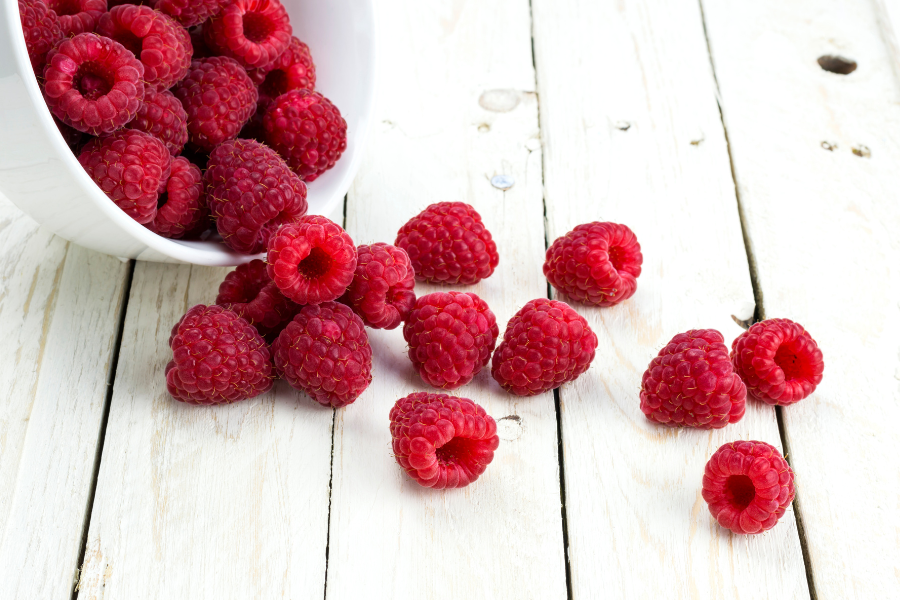What is up to all of our fellow dog lovers and pet parents out there!? Alright, picture this: you are mid-raspberry snack, enjoying some delectable, hand-picked wild raspberries when, out of the corner of your eye, you catch your dog giving you the cutest face he or she can possibly make. You know what that face means... those pleading eyes are begging you for you to share. Before you know it, you have given in and hand your dog a few berries. Now you are wondering if sharing is, indeed, caring in this scenario. Or is sharing raspberries with your pup problematic? Well, wonder no more because today, we're going to take a deep dive into the world of dogs and raspberries. Spoiler alert: it's going to be a juicy discussion!
Key Takeaways About Dogs and Raspberries:
- Dogs Can Snack on Raspberries! But like everything, moderation is key.
- Raspberries are low in calories and sugar, plus they're packed with fiber, vitamins, and antioxidants. A pawsome treat indeed!
- Antioxidant-Rich Goodness: These little red gems are full of antioxidants that can help fight inflammation and support overall health in our canine companions. Who knew a tiny berry could pack such a punch?
- Limit the Quantity: While raspberries are a safe treat, they do contain small amounts of xylitol, a natural sweetener that's toxic to dogs in large amounts. Stick to a few raspberries now and then to keep it safe and sweet.
- A Great Addition to Hot Days: Frozen raspberries can be a refreshing and hydrating treat during those dog days of summer. Just imagine the tail wags you'll get!
The Short Answer: Yes, But...
Alright, here is the skinny. Raspberries are not toxic for dogs to consume, so the answer is yes, dogs can eat some raspberries, but like all good things (and all things in life, in general), they're best in moderation. Raspberries are low in calories and sugar plus they're packed with antioxidants, fiber, and vitamin C and Manganese—sounds like a super snack, right? Well, it kinda is, but there’s a little twist, which we'll get to in a bit.
Nutritional Benefits: Berry Good News!
First off, raspberries aren't just tasty; they're healthy too! The antioxidants are great for fighting free radicals, reducing the risk of disease, and promoting overall wellness. Vitamin C? That's not just for us humans; your pooch can benefit from an immune system boost too. And don't get me started on the fiber; it’s fantastic for their digestion.
But maybe one of the coolest things about raspberries? They contain anti-inflammatory properties, making them a sweet little treat for older dogs dealing with joint pain. See, it’s not just about spoiling them; it’s about caring for them too.
Something to Keep in Mind... Xylitol
Remember the twist I mentioned before? Here it is. Raspberries naturally contain Xylitol, and while it's only a small amount, Xylitol can be toxic to dogs when consumed in large volumes. It's the scary monster in the closet, especially considering how well-disguised this natural sweetener can be.
But before you start raiding your kitchen to confiscate every raspberry in sight, remember that it's about quantity. The amount of Xylitol found in a few raspberries is typically well below the danger threshold for dogs. However, moderation is key. While a handful of these berry delights is okay on occasion, they shouldn't become a staple of your dog's diet.
Serving Suggestions: Doggy Delight or Dessert Disaster?
Here's how to make raspberries a doggy delight rather than a dessert disaster:
The Golden Rule of Moderation
If your dog is eyeing those raspberries with the enthusiasm of a squirrel on an espresso shot, remember the golden rule of moderation. A few raspberries here and there make for a lovely treat, not a full meal.
Fresh and Clean
Always serve fresh raspberries, thoroughly washed. Why? Because even the smallest trace of pesticides can be harmful to your furry friend.
Mix It Up!
For an extra special treat, try mixing raspberries with other safe fruits like blueberries and apple slices (minus the seeds, of course). It’s like creating a mini fruit salad for your pup, minus the dressing and the fork.
Watch for Allergic Reactions
Just like people, dogs can have allergic reactions to new foods. If it’s the first time your pooch is trying raspberries, start small. Keep an eye out for any signs of an adverse reaction, such as hives or gastrointestinal upset.
FAQs Unleashed
Can Puppies Eat Raspberries?
Puppies are like babies; their stomachs can be more sensitive. It's okay to introduce raspberries, but do so with extra caution and in very small quantities.
How Many Raspberries Are Too Many?
Think of raspberries as a precious gem—valuable but rare in your dog's diet. A good rule of thumb for a treat is that it shouldn't make up more than 10% of their daily food intake.
Can Dogs Have Raspberry Flavored Foods?
Generally, it's best to stick to the real deal. Artificial flavors and added sugars in processed foods are no-nos for your canine companion.
When to Consult Your Vet
Alright, so we have covered raspberries in some depth now - how they can be a healthy, tasty treat for your dog, but it's always important to remember that every dog is unique. What is fine for one dog to consume may not be great for the next. This is where consulting your vet comes in handy. If you're thinking about introducing raspberries, or any new food or supplement into your pup's diet, it's a good idea to have a chat with your veterinarian first. They can provide personalized advice based on your dog's health, dietary needs, and any underlying conditions that might affect how they handle new foods.
Especially for puppies, elderly dogs, or dogs with health issues, those on a special diet, or sensitive stomachs, your vet will be able to provide insight and guide you on the right serving size and frequency to ensure that these juicy treats contribute to their health rather than causing issues. And while you are there (or on the phone with your vet) you can use the opportunity to ask about other fruits and snacks you are thinking about possibly giving your pup.
Remember, it’s all about keeping those tail wags coming while maintaining a balanced diet. Your vet is your ally in ensuring your dog stays as healthy and happy as can be.
Wrapping It Up with a Bow(wow)
In the world of dog-friendly fruits and snacks, raspberries stand out as a bright and shiny option, that can carry both some benefits and a dash of caution. When given in moderation, they can be a tasty, healthy option for you favorite, best good friend (Forrest Gump reference).
But before we part ways, just remember we covered, with the main takeway being: when introducing any new food or supplement to your dog’s diet, it’s always best to consult with your vet. They know your dog and his or her health best, and will be able to give you advice for your dog specifically.
Now go ahead, enjoy that burst of raspberry goodness with your furry friend—sparingly, of course. Here's to creating more heartwarming, berry-filled memories with our beloved four-legged family members. Bon(e) appétit!
References
1) Ahuja V, Macho M, Ewe D, Singh M, Saha S, Saurav K. Biological and Pharmacological Potential of Xylitol: A Molecular Insight of Unique Metabolism. Foods. 2020 Nov 2;9(11):1592. doi: 10.3390/foods9111592. PMID: 33147854; PMCID: PMC7693686.



